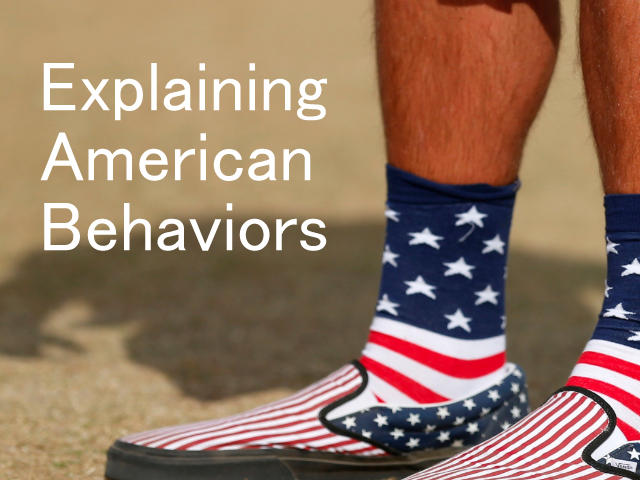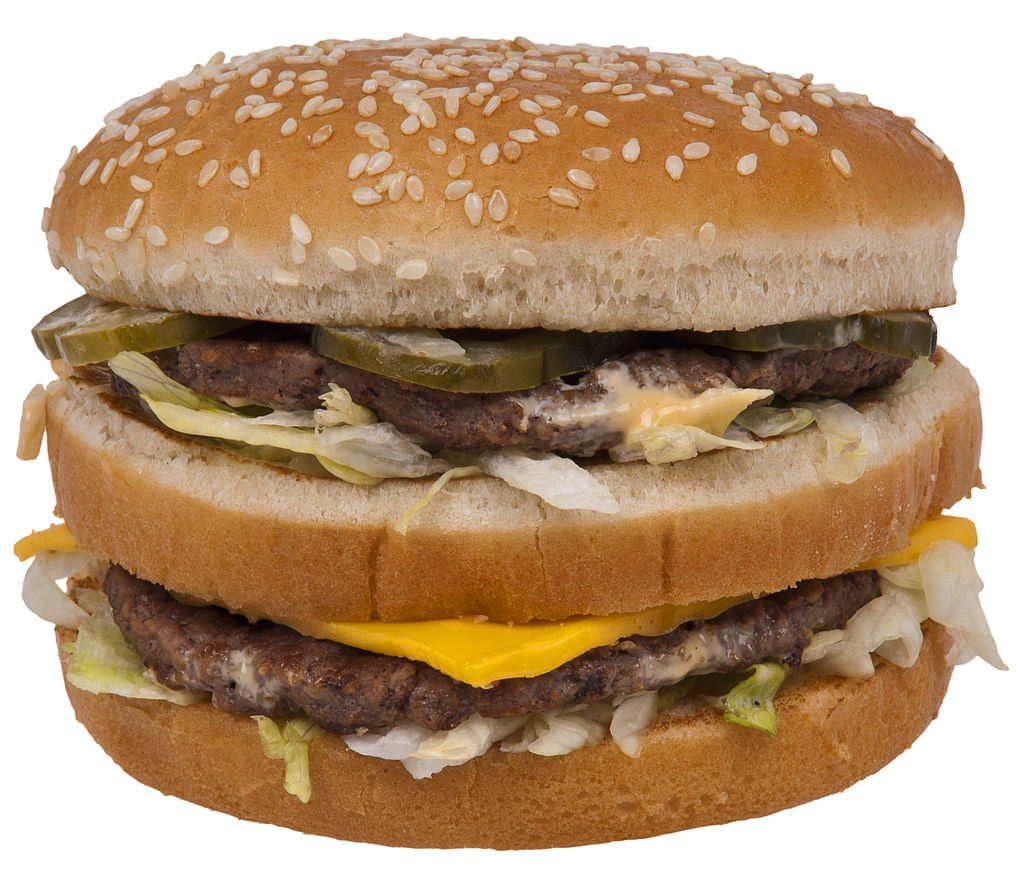
The Nod
You’ll see American men do this unconsciously. I’ve seen women do it too. The nod comes in two flavors, the upward jerk and the downward bob. The upward jerk is used for men (and sometimes women) the guy knows. It’s informal and similar to saying “What’s up?”. The downward bob acts as a more formal acknowledgement, an “I see you, but don’t want to bother you” greeting. It can be a signal of respect.
Distance Measured in Time

Sugar, Sweet Everything
Corn syrup appears in nearly everything in the United States. This cheap filler provides a boost of sweet and makes items that shouldn’t taste sweet, like bread, taste like desserts. All the sweetness strikes people outside of the US as odd. Bread, after all, shouldn’t be sweet. But American taste buds are ruined by cheap salt and syrups to the point where anything that tastes proper, like old-school “sugarless” bread, tastes bad or off. I’ve ran into people who can’t stand drinking water because it lacks flavor. One admitted to developing kidney issues after discovering iced coffee and drinking nothing but that. Water has a flavor–water. But flavors and sweetness aren’t considered odd by most Americans. For us, its how food is.
Price Tags Don’t Include Tax
Prices in American stores don’t reflect sales tax. You have to calculate that and add it in. Stores do this to create the illusion of lower prices. Some of this is because of laziness (or “cost cutting”) by the retailers. Sales taxes vary by county and by state. Not including them allows companies to avoid the headaches of regional pricing and offloads the responsibility (and cost) onto consumers.
The American Smile

American Exceptionalism
American Exceptionalism is the almost unconscious–I say almost because the phrase does show up in conversations about America time to time–idea that America is unique in the history of the world. Many Americans internalized this idea and don’t think much about how it effects their actions. The phrase takes for granted our relationship with the world and involves a sense of entitlement. Americans expect welcome when they travel overseas. The unconsidered sense of superiority (which is inherited from the defunct British Empire) carries into unintentionally disrespectful behavior toward other cultures, such as being loud or pushy. It also carries over to create a sort of blindness to the faults of American society and an unwillingness to make drastic societal changes that would make the US truly exceptional, such as attacking the roots of drug abuse at a societal level–depression, hopelessness, lack of purpose, lack of community. The US does have good things going for it, but American Exceptionalism works against those great aspects by creating a collective arrogance.
Hyperbolic Excitement and Tragedy

Nudity and Sex are Taboo, but Killing People is Okay
We Americans have a strange relationship with sex, nudity, and violence. First, nudity can never be innocent. It always has a sexual component to it. As you likely know, Japan has a different attitude toward nudity, at least child nudity. Nudity itself isn’t a big deal unless it is meant to be sexual. Children like to run around naked, as any parent knows, and manga/anime aimed at young children shows this normal part of childhood. However, this is taboo in the US. Nudity can never be innocent, even with young children involved. There’s always a fear of sexualizing–child predators in the case of our argument. When it comes to adult nudity, despite the long tradition of nude art, there is always a sexual, pornographic component. We struggle to admire the body for its beauty and just its beauty. Instead, there often is an element of objectification, of possession, of a nude body.
Conversely, violence is accepted. Television shows teem with violence and death. Blood is fine to show but not female breasts. It’s perfectly okay to show people being shot, mauled, or hurt. But making life is wrong to show. I’ve heard people talk about the sexuality in various TV shows, but they make no mention of the violence. Even foul language garners more of a response than violence.
Lack of Volume Control

Individualism plays another role–it affirms your view and voice should be heard and is more important (to you, anyway) than the voice of others. The end result? Conversations tend to get loud as people keep talking over each other. Hyperbolic excitement plays into this too. American culture expects people to speak loudly when they are passionate and excited. Calm and logic isn’t seen as passion or excitement. I’m soft-spoken and calm, and I’ve been accused of being a cold-fish, never excited about anything. This isn’t to say I don’t get loud. I’m an American, after all, and I’m not always aware of my volume relative to others. But I don’t like to emote in conversations. Some people don’t care about the sensibilities of others either. I hate Harley Davidson motorcycles. They are obnoxiously loud and disruptive when they zip past. But that’s is their selling point. It’s an expression of individualism. People can’t do anything except notice you as you pass. Some people are like that with their conversations, especially with soapbox issues they are passionate about, such as gun rights and religion and abortions.
American Behaviors Aren’t Strictly American
These behaviors aren’t limited to the United States. They also affect anime. The reservations around nudity leads to anime’s censorship (Japan has its own reservations about nudity) and many stories never make it to the US in the first place. Every culture has certain norms people internalize and consider natural. That naturalness disguises the fact such behaviors are cultural and not necessarily a human norm. Some writers tailor more American-friendly messages that include some of these behaviors. I find it fascinating when these writers look in on the United States and comment about the culture.
Despite being American, I am critical about many American behaviors, particularly hyperbole and loudness. Hyperbole is dangerous because it removes the ability to communicate properly. It is better to reserve certain words for when they are merited. A catastrophe is an event that kills hundreds if not thousands of people. It isn’t something as inane as a celebrity divorce. Likewise, people toss about sacred words too readily. It is better to use words like Jesus, Muhammad, Buddha, and the like rarely so they retain their reverence and impact. Sadly, I hear Jesus uttered so often that the name has about as much meaning as the word car. American culture needs to learn the value of silence.
This list falls a bit on the negative side. It’s easier for me to see the negative aspects of American culture than the positive, sadly. The American Smile can come off as friendly–which is the point. Americans are also neighborly. Just yesterday I joined my neighbors in shoveling snow from each other’s driveways. I selected the behaviors on this list because I’ve had to explain them to my foreign friends. The behaviors confused them.
Are there any other American behaviors that confuse or trouble you?




As an American, a lot of what you said makes sense, and I can see how it’s generally true.
However, I don’t think it’s as simple as some of these only having a negative side. I think these issues are more nuanced.
American Exceptionalism for example. Yes, we as a nation have problems with our society, but we also have come a long way in some ways (such as racial relations), and we have a nation with an incredible amount of freedoms. I know people can get blinded by heavy amounts of patriotism, however, isn’t some of that good. I mean what country would survive if they didn’t have a fair amount of people who thought of their country as the best. I’m certain there are some Japanese who think Japan’s the best, some British who think Great Britain is the best, etc.
Also, you can think your country is exceptional, but still recognize it’s faults and learn from and respect other countries and cultures.
Being really loud and Hyperbole. I can see the negative effects of these, however on the flip side, sometimes a vast amount of emotional energy and noise can move people towards something that pure logic can not. While, this can be a negative thing to control the masses, but you can also argue logically with intense emotion. Sometimes, only than will people be convinced of the truth. (I’ve heard of people who only seriously listened to christians once they got emotionally charged in their apologetics). God himself is perfect in being. The laws of logic and human emotion perfectly reside in God’s being continually. I mean he even loves and hates sinners at the same time (Paradox?).
As for Jesus he said in Luke 14:26 “If any man come to me, and hate not his father, and mother, and wife, and children, and brethren, and sisters, yea, and his own life also, he cannot be my disciple. ” Yet, it also says in scripture we are to honor our parents and love others. Either this is a contradiction or hyperbole. I deduce hyperbole in the form of something like “Your love for God should be so strong, your love for even your closest relatives will seem to be hatred.” That’s how Ray Comfort would argue as well.
I find the fake smiles uncomfortable too, but I want to argue Devil’s Advocate here. In the Beatittudes, 1 Timothy 1:11, and 1 Timothy 6:15 the word “blessed” comes from Makarios in the greek, and it could also be translated as “happy”. This word in beatitudes marks the state of born again believers, and in the passages I mentioned in 1 Timothy is referring to the nature of God himself. It’s hard, I’m not denying sadness and other emotions as legitimate. But I believe I should generally be happy as a Christian biblically speaking. Also, I’ve heard of studies where you can fake it to you make it.
Again, I find some the fake niceness off putting, and when I notice it from myself I cringe. However, I think there’s reason behind it, and not some complete inane behaviour.
Anyways, I agree you make valid points. However, please don’t throw the baby out with the bathwater. There are some really great facets of American culture you should be proud of. Also even some of these things you mention have a positive flip side to the coin.
I totally agree with the uneccessary sweetening of certain products.
I say this as somebody who’s interested in Japanese culture myself.
My bias showed through in the article. I don’t dislike America, but I do believe we must move beyond the idea of nations and other groupthink that divides us.
I write against exceptionalism because it is divisive (I grew up watching Star Trek, so that colors my view of how we should behave as nations). It is true that we can view a nation as exceptional and still work to correct its faults, but too often the idea of exceptionalism, as with most group labels, speak to our lower-level urges of us-vs-them thinking. After all, the idea of exceptionalism requires other cultures to be typical or average, but who defines that standard of measure?
Hyperbole has a place, but it is far over used in society now. Hyperbole has lost its ability to move us, and it often renders language as meaningless. I agree with your assessment of Luke 14:26–it illustrates good hyperbole, but many throughout history have misinterpreted it. I distrust emotions that aren’t tempered by reason. Scripture warns us to beware unfettered emotions. They landed many people into sin. I don’t see loving and hating as a paradox. In the end, they are the same thing and cannot exist without each other. After all, we can’t measure anything without some opposite. Without hate, love cannot be understood. Life cannot exist without death (even in Eden plants had to die to feed the animals and humans).
I understand the scriptures you reference a bit differently. Happiness is more a state of mind than an emotion. It is a decision that emotions follow. According to Zen, you can be in pain and not suffer if you have the correct state of mind. We see that in the New Testament too. The Beatitudes point to this blessed state as being more than an emotion by itself. If anything, the emotion of happiness creates suffering because it is a fleeting feeling (as emotions always are) that we cling onto. True happiness is a state of mind that lets emotions come and go without holding onto any of them. It’s a state of accepting reality as it is, basically, and striving to center yourself on that Reality (ie. God). That is what I get out of the Beatitudes, and that means we shouldn’t plaster a fake smile all the time. It denies reality. 😀
Yes, American culture has great points that can be improved upon.
Thanks for making great points!
Since I’ve watched anime and learned about Japanese culture, I have realized that I am guilty of most of these American traits. I think your post is spot on and much needed food for thought. Great post.
Thanks! I am guilty of them too. But awareness will help us curb them.